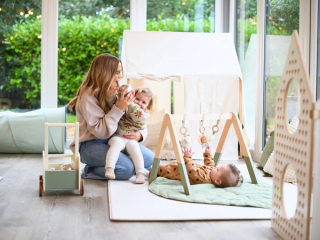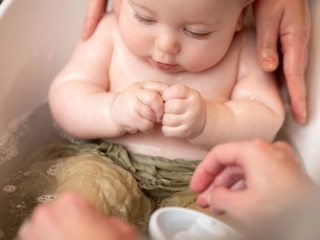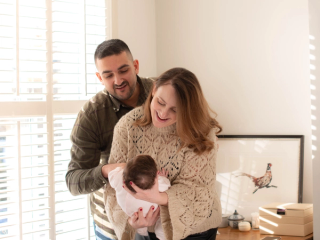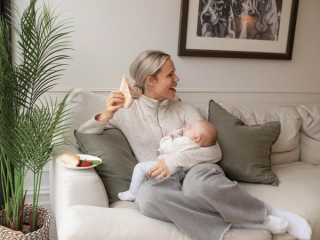
- Home
- Advice Hub
- Newborn
- New Parent Support
- How To Budget For Childcare Costs
How to budget for childcare costs
Childcare costs are a hot topic at the moment, with new funding being phased in to help parents with the costs - but how do you know what you can claim, how many hours you get and how to budget when paying for childcare?
Returning to work from maternity or parental leave is an emotional business, and a big adjustment for any new parent. But alongside the emotional upheaval, there can also be financial stress. Childcare costs are a hot topic at the moment, with new funding being phased in to help parents with the costs - but how do you know what you can claim, how many hours you get and how to budget when paying for childcare? Here’s a handy guide that might help you to get things straight.
What are the different options when it comes to choosing childcare?
One of the first decisions you’ll likely need to make is what kind of childcare you prefer for your child. Sometimes, this might be dictated by availability and price, but it’s good to think about what type of care might suit your family’s needs best.
A nursery setting generally hosts more children in an environment that is somewhere between a home and a school in look and feel. Your child might be looked after by multiple members of staff, but they will usually have a key worker, who they form a bond with. Nurseries are quite a reliable form of childcare, as they do not fall through when one staff member is sick, and often have a choice of different hours available.
A childminder will usually look after your child in their own home, and be their sole carer while you are working. This often means a lovely, close bond, but also means that if your childminder is ill, you will need to arrange other care or take time off work yourself. Childminders also may not offer full time hours.
A nanny usually cares for your child in your own home, and may work flexibly – which could be ideal if you have a job that requires you to work evenings and weekends. Similar to a childminder, a nanny may require a backup option for if they are ill, and you will need to file paperwork via HMRC to officially employ the nanny.
How much does childcare actually cost?
How much your childcare costs will depend on your choice of childcare and where you live. It can vary wildly from city to city, even within the UK, so it’s always best to find out the rates of your local preferred childcare provider so that you can budget accurately. However, the average cost of childcare in Britain for a full-time place (50 hours per week) is £269.86 per week, or £14,030 per year, while a part time place (25 hours per week) is £138.70 per week, or £7,210.
What government support is available for childcare costs?
If those figures make you want to weep, it’s worth remembering that there is some help available in the form of government support with childcare costs, which can be broadly divided into three categories: tax free childcare, free childcare hours and the childcare element of working tax credit.
Tax-Free childcare allows you to save 20p for every pound you pay for childcare, up to a limit of £500 every three months (this goes up to £1,000 every three months for children with a disability). It’s available for children up to the age of 11 with any Ofsted registered provider. You need to have an account set up, which you can pay into from your bank account, and pay out directly to your childcare provider once the government top up has been added.
The free childcare hours are the talk of the town at present, as the government recently announced a big shake up and additional eligibility. All parents are currently entitled to 15 hours of free childcare for children over three years old, with those who meet the eligibility criteria being entitled to 30 hours per week. From April 2024, eligible parents will be able to claim 15 hours of free childcare, with children over 9 months being eligible from September 2024. By September 2025, all eligible parents of children over 9 months old will be able to claim 30 hours of free childcare per week .
Eligibility for both of these schemes depends mainly on how many hours you work and how much you earn. Households in which any parent earns more than £100,000 per year are not eligible for the additional hours or tax- free childcare, The childcare element of working tax credit is means-tested. Visit the government website or Citizen’s Advice to find out more.
The landscape is rapidly changing - where can I go for the latest information?
As we wait for the government’s plan to be rolled out, bear in mind that there is an election on the horizon, so it’s a good idea for working parents to keep an eye on any changes happening. There are calls for eligibility criteria to be changed in order to be fairer to one-parent households, and a review of how child benefit eligibility is calculated, which has similar issues, has been promised. To get the latest information on eligibility, updates on the rollout and more, visit https://www.childcarechoices.gov.uk/.
For information specific to Ireland, refer to HSEand Citizens information websites.
Advice & tips

Want to read more? Join the HiPP BabyClub for full access to this article.
As a BabyClub member, you'll get access to a range of exclusive benefits, including:
Monthly competitions
Discounts from our Partners
Expert advice tailored to your little one's age
Weaning recipes
HiPP shop discounts*
*10% off HiPP's online shop does not apply to our First Infant, Anti-Reflux or Comfort Formula Milk.
Important notice: Breastfeeding is best. Follow on milk should only be used as part of a mixed diet from 6 months. Talk to a healthcare professional.
















